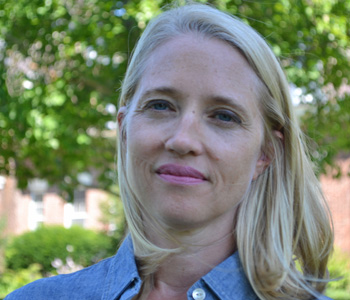Sibyl A. Schwarzenbach
On Civic Friendship: Including Women in the State
Columbia University Press
360 pages, 9 x 6 inches
ISBN 978 0231147224
Historically speaking, theorizing the nature of the political state from a feminist point of view is in its earliest stages. So my book offers a novel feminist account of the foundations of the (just) modern state.
On Civic Friendship also offers a new vision of constitutional democracy. Rather than conceiving of women and their traditional roles as mere afterthoughts to a conception of the citizen that remains primarily male, I view women’s traditional work and activities as situated at the heart of this distinctive governmental form.
Central to my argument is that women, throughout history and across the globe, have continued to perform the vast majority of reproductive labor and praxis in society—that form of ethical activity that reproduces not merely biological beings but educated, reasoning, and mature persons.
In contrast to the traditionally male citizen role of soldier (which aims to defend against or kill the other) or to that of provider (where the modern focus is on the production of things and exchange value), traditional female reproductive praxis aims at the reproduction of human relations – in the best case, at relations of friendship or philia for their own sake. I use the Greek term philia for its scope is broader than the English friendship; philia includes the good relations between parents and children, siblings, lovers and even fellow citizens.
Aristotle already recognized the importance of women in reproducing relations of personal philia (far more complex then simple “care”). He also argued that a political version of friendship (politike philia) is a necessary requirement of justice for any polis or state. Unless there is an institutionalized background of good will in a society—a reciprocal friendly attitude, trust and rough maintenance of equality, visible and embodied in a state’s constitution, its laws, customs and social institutions—citizens can (and often will) perceive themselves to be unjustly treated.
In a general context of enmity and ill will, that is, or in one of pure competition or indifference, and given our natural and often unreasonable propensities to favor ourselves, citizens will be unable to recognize and accept in practice the burdens of justice. In such an unfriendly, hostile or indifferent environment, the poor will have little motive to follow the laws, the well to do will refuse to yield their unfair advantages, and only a sham justice of the powerful can reign.

Women, throughout history and across the globe, have continued to perform the vast majority of reproductive labor and <em id="">praxis</em> in society—that form of ethical activity that reproduces not merely biological beings but educated, reasoning, and mature persons.
Despite the major transformation of consciousness occasioned by the 20th century women’s movement, and on a scale that suggests powerful historical forces are at work, the modern political state is amongst the last and certainly among the most powerful of institutions that needs not only to be transformed, but in the first instance reconceived.
This nation-state has the dubious distinction of being perhaps the most “male” of all our institutions. Particularly in the United States, the state persists in signifying raw physical power and the monopoly of organized force (as Max Weber viewed it) and it continues to possess the power to legislate laws with the penalty of death (John Locke’s definition). So too, the state’s primary functions are still conceived in terms of the male roles of “protection” against both external enemies (a powerful military and preparedness for war) as well as internal foes (a strong police and internal security force, extensive prison system, etc.) coupled with the regulation and policing of economic competition (production and finance).
These crucial and central functions are reflected in the individual duties expected of “the citizen”—the duties of soldier in times of war, and of producer and taxpayer in times of peace, with occasional voting and jury duty thrown in. None of these roles was traditionally a woman’s. And thus, not surprisingly, for the vast majority of the history of the political state, both ancient and modern, over half of the population characteristically remained “passive,” residing outside of the political state narrowly conceived.
Even in recent years, the tendency of feminist political theorists has been towards exploring the realm of “civil society” and those many private associations, social movements, and forms of public communication that constitute it. This tendency to focus on civil society, however—and the propensity to view it as the primary locus of liberation—runs the risk of leaving the powerful state largely unattended and its nature only marginally placed into question.
My own aim is to expose the heavily biased and gendered foundations of the modern political state, in order to help transform this powerful and deadly apparatus into something else—an institution more fundamentally in the service of human and other needs, and with a primary duty of furthering relations of friendship among citizens, and, internationally, among states.
In the book’s preface I dive into what I has been much overlooked in the modern period: the importance of friendship, how it seems to differ for women, and not just its importance personally, but also in what I call its civic form.
A central mistake I see repeatedly made by many in the modern West is to think of friendship as merely a personal relation. It actually has important civic analogues. Consider three traits that (I argue) appear to be essential to genuine friendship: a reciprocal liking and awareness of the other as moral equal, a reciprocal wishing that other well for their sake (and not for one’s own), and a reciprocal practical “doing things” for the other. How can these essential traits possibility be applicable when we are dealing with a population, say, of many millions?
In civic friendship (unlike in personal) the above three traits don’t operate directly but via a society’s public laws, social institutions and customs. That is, my “awareness and liking” of fellow citizens is revealed, first, in my being informed and educated about how citizens live in other parts of my city or country. Further, I might wish them well civically by being willing to help them in times of crisis or (at the very least) not begrudging them my tax dollars for basic assistance in education, housing or health care, etc.
Even my personal enemies I can treat as civic friends; this means only that I grant them the respect and rights due any American. Obviously the state, and a set of universal individual rights, play a critical role in regulating our awareness of the facts of other citizens’ lives (e.g. through education and other institutions) as well as in stipulating the minimal duties we have towards them.
No doubt I was first led to the topic of rethinking the foundations of the modern political state by my years studying abroad in the 1970s. I viewed the American state from the outside as the Vietnam War had just ended, and I experienced directly the myriad ways in which social and political institutions may be well organized. Upon returning to the U.S., I eventually came to the conclusion that what was lacking was the value of fraternity, what I now call civic friendship.
The original American founding fathers had hoped to avoid “injurious faction.” But, in the United States, the gap between the haves and the have-nots has grown ever larger since the 1970s—it is already greater than at any point since the Great Depression. We have a ruling corporate culture that is hierarchical and secretive instead of democratic and open. Our electorate is so apathetic that roughly half of eligible citizens don’t even vote. And we may be the most violent of all advanced industrial nations, with gun ownership still enshrined in our Constitution, and with roughly one out of every 32 adults behind bars or on probation or parole. Our military expenditure comes close to outstripping that of the rest of the world’s military powers combined.
Despite all our wealth and power, however, we are one of the most pusillanimous of modern industrial nations in terms of the public granting of welfare or benefits. We are the only major industrialized democracy without universal health care—with 48 million uninsured. Our system of family leave plans is inadequate and our short-term welfare benefits are punitive. Our public schools are failing and our aid to foreign countries has fallen to 0.1 percent! Our awareness—let alone positive concern—for our fellow citizens and the rest of the world is shockingly low.

I argue for an economy that recognizes not just productive labor for exchange, but equally ethical reproductive praxis as well.
I argue for an economy that recognizes not just productive labor for exchange, but equally ethical reproductive praxis as well. Similarly, our agonistic, two-party legal system actually produces inequality, whereas proportional representation would come closer to expressing a civic ideal give and take. The work of raising children and of reproducing citizens must become a major concern of government if women are ever to become full citizens and equally represented.
Perhaps one of the most radical analyses the book offers is that of our capitalist economy and the institution of “private ownership” from a feminist point of view. John Locke long ago argued that in the natural state man “owns” that with which he has “mixed his labor.” With this claim Locke had the private rewards of agricultural labor in mind, and the metaphor also covers craft production and extends to factory labor owning a private wage. But consider a traditional woman “mixing her labor” with her family, household and children. The woman does not obtain anything in the form of private disposable property—she even “gives” her child away when the child reaches maturity.
My hope is that this work might occasion a novel way of looking at both the strengths and weaknesses of our modern political state—and thereby help provide a new theoretical justification for progressive change. For first must come the theoretical task to conceive how we might transform various economic, social, and legal structures without violating essential individual freedoms.




We don't put paywalls. We don't distract you with ads. We don't sell your data.
Please help to keep this running!